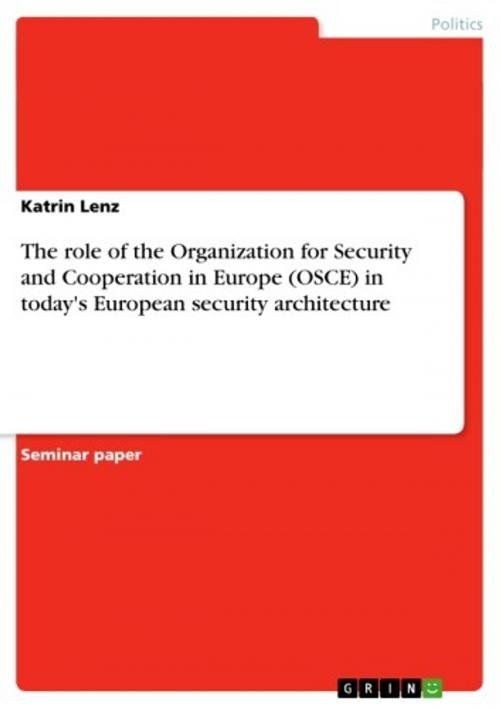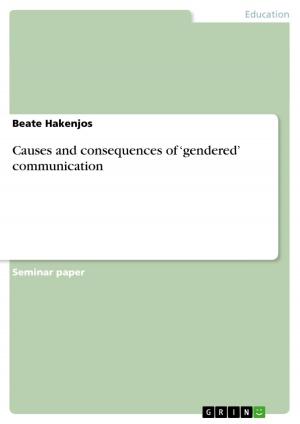The role of the Organization for Security and Cooperation in Europe (OSCE) in today's European security architecture
Nonfiction, Social & Cultural Studies, Political Science, International, International Relations| Author: | Katrin Lenz | ISBN: | 9783638413589 |
| Publisher: | GRIN Publishing | Publication: | August 31, 2005 |
| Imprint: | GRIN Publishing | Language: | English |
| Author: | Katrin Lenz |
| ISBN: | 9783638413589 |
| Publisher: | GRIN Publishing |
| Publication: | August 31, 2005 |
| Imprint: | GRIN Publishing |
| Language: | English |
Seminar paper from the year 2003 in the subject Politics - International Politics - Topic: International Organisations, grade: 1,0, Schiller International University , course: Internationale Organisationen, 44 entries in the bibliography, language: English, abstract: The idea of seeking security through an international organization is certainly not new. Immanuel Kant envisaged it already over two centuries ago in Idea for a Universal History from a Cosmopolitan Point of View (1784). 'Through war, through the taxing and never-ending accumulation of armament... after devastations, revolutions, and even complete exhaustion,'Kant foresaw that'human nature would bring people to that wh ich reason could have told them in the beginning: that humankind must step from the lawless condition of savages into a league of nations to secure the peace.' The Concert of Europe, the League of Nations, and the UN were all built upon the principle of preserving peace. One can argue about their successes and failures, but the UN is now more than fifty years old and is still an important player in the global security architecture through for instance its peacekeeping operations. The UN Charter states in Article 1 that all members shall be committed 'tomaintain international peace and security, and to that end, to take effective collective measures'to preserve or restore the peace and Article 24 provides the Security Council with the 'primary responsibility for the maintenance of international peace and security.' The concept of 'collective security' was a principle of the League of Nations and is included in the UN Charter as well. It basically means that an aggression against one member state will be regarded as an aggression against the collective and lead to joint action (economic sanctions, military action, etc.) against the aggressor. This concept has so far not been very successful: mainly, but not limited to, because countries are not willing to accept collective action above their national interests. Besides the UN, there are also regional organizations, which aim at preserving peace and security. One of them is the OSCE (Organization for Security and Cooperation in Europe), which will be examined in this paper. Is the OSCE successful in its attempt to preserve peace and security and encourage cooperation in Europe? What is its role in today's European security architecture (NATO, EU, and UN)? And is it still important after the end of the Cold War? This report aims at answering these questions. The background information in the first part of the paper is mainly taken from the OSCE Handbook, unless otherwise indicated.
Seminar paper from the year 2003 in the subject Politics - International Politics - Topic: International Organisations, grade: 1,0, Schiller International University , course: Internationale Organisationen, 44 entries in the bibliography, language: English, abstract: The idea of seeking security through an international organization is certainly not new. Immanuel Kant envisaged it already over two centuries ago in Idea for a Universal History from a Cosmopolitan Point of View (1784). 'Through war, through the taxing and never-ending accumulation of armament... after devastations, revolutions, and even complete exhaustion,'Kant foresaw that'human nature would bring people to that wh ich reason could have told them in the beginning: that humankind must step from the lawless condition of savages into a league of nations to secure the peace.' The Concert of Europe, the League of Nations, and the UN were all built upon the principle of preserving peace. One can argue about their successes and failures, but the UN is now more than fifty years old and is still an important player in the global security architecture through for instance its peacekeeping operations. The UN Charter states in Article 1 that all members shall be committed 'tomaintain international peace and security, and to that end, to take effective collective measures'to preserve or restore the peace and Article 24 provides the Security Council with the 'primary responsibility for the maintenance of international peace and security.' The concept of 'collective security' was a principle of the League of Nations and is included in the UN Charter as well. It basically means that an aggression against one member state will be regarded as an aggression against the collective and lead to joint action (economic sanctions, military action, etc.) against the aggressor. This concept has so far not been very successful: mainly, but not limited to, because countries are not willing to accept collective action above their national interests. Besides the UN, there are also regional organizations, which aim at preserving peace and security. One of them is the OSCE (Organization for Security and Cooperation in Europe), which will be examined in this paper. Is the OSCE successful in its attempt to preserve peace and security and encourage cooperation in Europe? What is its role in today's European security architecture (NATO, EU, and UN)? And is it still important after the end of the Cold War? This report aims at answering these questions. The background information in the first part of the paper is mainly taken from the OSCE Handbook, unless otherwise indicated.















